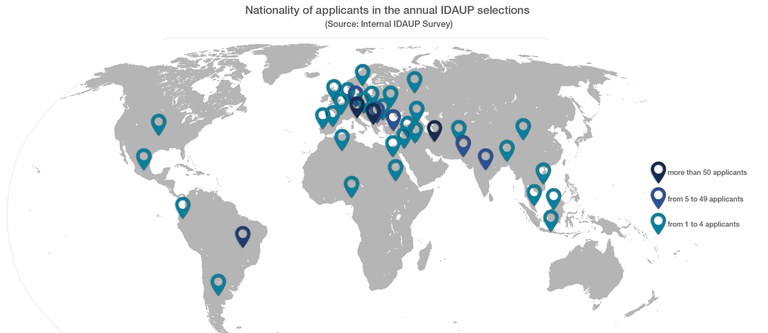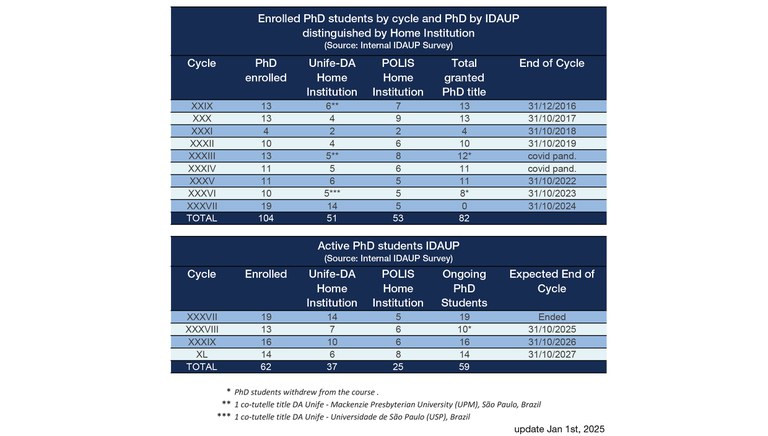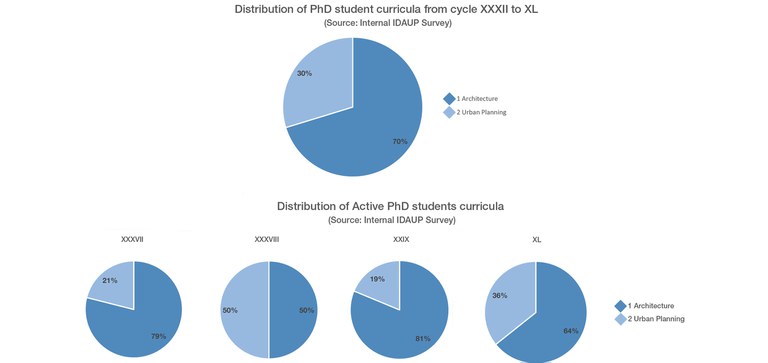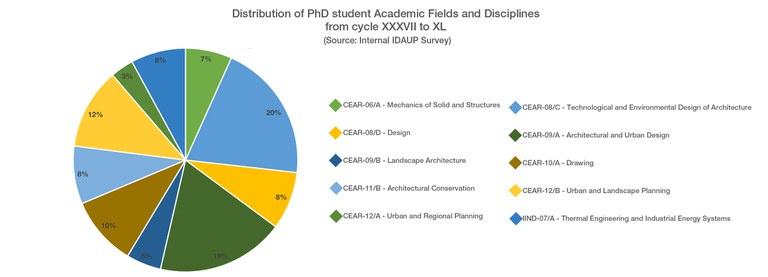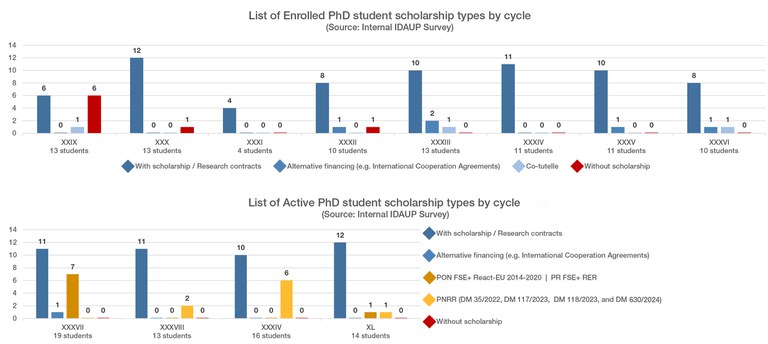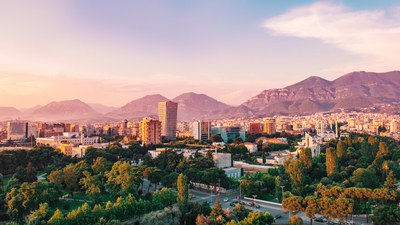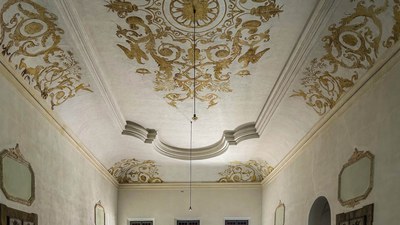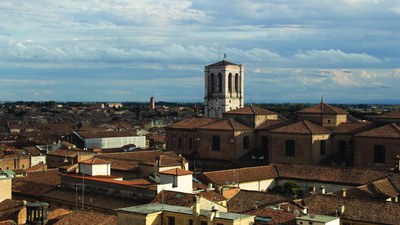Doctoral programs
IDAUP International Doctorate Architecture and Urban Planning
Double Joint PhD Programme with Polis University, Tirana (AL)
IDAUP is a doctoral program established as part of a Double Joint PhD Programme in collaboration with its main partner, POLIS University of Tirana (Albania). It is open to graduates from around the world holding a master’s degree or an equivalent qualification. The cultural motivation underlying IDAUP lies in the need to address innovative, interdisciplinary, multidisciplinary, and transdisciplinary research topics in the fields of architecture, design, and urban planning. Particular attention is given to the priority objectives of the European Union's Framework Programme for Research and Innovation, the Horizon Europe program, and the current National Recovery and Resilience Plan. Key cross-cutting themes include the Sustainable Development Goals of the 2030 Agenda, digital and energy transition, smart environments, the Internet of Things, artificial intelligence, and robotics. These areas serve as focal points for defining highly innovative research trajectories, potentially concentrated on issues related to the Built Environment. This global-scale scenario shapes the framework of motivations and potentials for the educational project, emphasizing the need to train individuals with strong research aptitude who can work in synergy with basic and applied research sectors in industrial and entrepreneurial contexts. These individuals should also be prepared for future roles as educators and instructors within educational and research institutions.
Academic Board
Unife Members
Theo ZAFFAGNINI (Coordinator)
Veronica BALBONI (Vice-coordinator DA IDAUP)
Membri afferenti a Polis University Tirana
Besnik ALIAJ (Rector of Polis University Tirana - PhD Program Vice-coordinator IDAUP)
Membri afferenti ad altre Università
Manuela ALMEIDA (University of Minho)
Gianni LOBOSCO (Politecnico di Torino)
Paulo MENDONÇA (University of Minho)
Laura PEDATA (Sheffield Hallam University)
Paola PUMA (University of Florence)
Beatrice TURILLAZZI (Alma Mater Studiorum – University of Bologna)
Membri esterni
Marco MEDICI (Inception s.r.l.)
Alessandro PRACUCCI (Levery s.r.l. Società Benefit)
Laura VANDI (Focchi SpA)
Rappresentante dei Dottorandi
Maristella DE FABRIZIO (XXXIX ciclo)
Educational Objectives
The primary objective of IDAUP is to train young researchers of high scientific qualification, equipped with multidisciplinary and interdisciplinary skills and competences suitable for actively and effectively engaging in contemporary international debates on research topics related to the two active curricula: Architecture and Urban Planning.
IDAUP's educational offering is geared towards the acquisition of knowledge and skills concerning theories, methods, and tools, both disciplinary and interdisciplinary, for research in the fields of architecture, urban planning, and design. This is achieved, among other means, by enhancing PhD students' networking abilities with the productive and social world and by fostering the development of innovative theories and applications.
The multidisciplinary methodological orientation of the training and research activities is based on the need to educate scholars with a strong specialization who are also capable of understanding and interacting with diverse fields. This approach stems from the recognition that any scale of design is a complex and continuously evolving process.
In this perspective, the program also emphasizes the development of skills and autonomy in managing the complexities (administrative, legal, etc) inherent in research activities, particularly in relation to public administration policies and European policies on environmental, economic, and sociocultural sustainability. Specific knowledge of international market and research scenarios, adequate language skills for international contexts, multidisciplinary training, and extended research experiences abroad are the qualifying competences of IDAUP PhD students.
To achieve these objectives, IDAUP draws on the expertise of its Main Partner, POLIS University of Tirana (AL), as well as the educational and scientific contributions of other prestigious foreign universities, active as Associate Partners, such as the University of Minho in Guimarães (PT). These institutions, represented by their faculty members within the program's board, provide facilities, resources, and laboratories for IDAUP PhD students.
Relationships with industrial and entrepreneurial entities active in the field are also aimed at aligning PhD students' research with the most strategic directions in terms of sustainability, industrial strengthening of Green production policies, and the development of virtuous practices in Circular Economy and productive energy efficiency. In this regard, the program maintains a privileged relationship with Focchi SpA.
Research Topics
In the perspective of providing a research training pathway aligned with the responsibilities that contemporary society assigns to the themes of architecture, the city, and, more generally, the transformative actions concerning the territory and the built heritage—in terms of environmental, economic, and socio-cultural sustainability—the faculty board has established two curricula, within which specific research topics are identified to guide the development of doctoral theses.
1) Architecture
This curriculum focuses on identifying and deepening strategies capable of creating synergies among the rationales of design, process, and production, encompassing technologies based on the use of innovative materials, industrial design, and applications in restoration and upgrading of existing buildings. It pays special attention to themes such as green policies (design and supply chain in the construction sector), digital innovation, energy efficiency in buildings, components, and industrial production cycles.
Research topics include:
1.1) Design theories and methods and sustainable constructions.
1.2) Inclusive design, design for all, accessibility to spaces, products and services, sustainable design.
1.3) Innovative technologies and materials for industrial, building and structural design.
1.4) Materials and techniques for the conservation of historical heritage, building maintenance and Life Cycle Assessment (LCA) considerations.
1.5) Cultural heritages. Innovations and ICT processes for cultural heritages use and conservation.
1.6) Building envelope for the digital era. Strategies and innovative solutions for multifunctional prefabricated façade in digital construction.
1.7) Digital transition: product and process in the digital age for the construction industry.
1.8) Business models for catalyzing innovation in the construction industry.
1.9) Green Transition strategies for increasing sustainable practices in the construction industry, within the built environment.
1.10) Innovative methods, technologies and applications for energy efficiency in the construction sector and the utilization of renewable energies in relation to the built environment.
1.11) Architectural and urban design methodologies, adaptive reuse tools, and strategies for art and culture in inclusive cities and sustainable environments, also considering the built environment.
2) Urban Planning
This curriculum addresses contemporary issues of public space, focusing on the evolution and transformation of the socio-economic and environmental context. It explores the role of research as a critical tool for analyzing, interpreting, and designing urban and territorial transformations from a sustainable development perspective, adopting an interdisciplinary approach with an international outlook.
Research topics include:
2.1) The city of today and tomorrow: balancing environmental protection with the regeneration of the existing urban fabric. Public space, transformation needs, and new social demands for quality living and urban livability.
2.2) The role of the historical and cultural heritage of the built environment and landscape in urban development in a post-industrial economy, with particular reference to sustainable local development policies.
2.3) Territory, landscape, and the regeneration of the built environment, between infrastructural interventions, new energy sources, and climate change.
2.4) Territorial / city governance and targeted development policies through land management, economic and financial tools.
2.5) Climate change, new socio-demographic configurations, and health determinants: cities facing the challenges of adaptation and the fight against inequalities.
2.6) Settlement models, sustainable mobility, big data, and new technologies in support of policies, programs, and projects for greater urban quality and livability.
2.7) Design, history, and theories of urban form: the sustainability of settlements across centuries.
From the first year, PhD students begin developing their research, guided by their tutors' methodological directions, progressively increasing autonomy in their areas of exploration and choosing the most appropriate investigation methods to achieve their objectives. Meetings with stakeholders, aligned with expected results, may strengthen doctoral research. Such experts may also assist tutors in supervising research, encouraging interdisciplinary or transdisciplinary approaches.
PhD students are encouraged to validate interim research outcomes through scientific dissemination forms, such as publications, participation in conferences, or other engagements with the relevant academic community.
The central role and autonomy of each PhD student in their research are further supported by opportunities for additional funding, such as individual three-year research budgets and potential short- or long-term international mobility grants. Moreover, PhD students have access to facilities and laboratories at their institutions for conducting research activities.
Training Program
For each academic year, the Academic Board approves a programming plan that outlines the implementation of training activities, defines the equipment and services accessible to PhD students at the participating institutions, and specifies the availability of financial resources for mobility and research budgets for the cycle to be established. The information is published online on the websites of both universities once the course has received ministerial accreditation. The internal regulations of the course provide the guidelines that govern the specific objectives, internal organization, and rights and responsibilities of the IDAUP PhD candidates.
Based on their specific scientific expertise (including interdisciplinary skills), each faculty member is required to contribute to one of the two active curricula: Architecture and Urban Planning. Depending on the proposed research project, each PhD student is assigned a primary tutor affiliated with the selected host institution and a co-tutor affiliated with the partner institution, with specific exceptions subject to evaluation by the Academic Board. For PhD students active in industrial settings, an Industrial Co-Tutor is designated.
IDAUP organizes training activities primarily in the first year, aiming to deliver most of the courses focused on the theories and methods of scientific research in the fields of architecture, design, and urban planning. These activities are preparatory to the development of the doctoral project.
Courses
Regarding the three syllabi of the IDAUP Program:
1) Methods of Architectural Research
2) Multidisciplinary Approaches to Urban Planning
3) Research Theories and Legislative Policies for Sustainable Planning
Four courses are offered in English:
1. Theories, Tools, and Methods of Contemporary Architectural and Technological Research (Disciplinary and Interdisciplinary)
Teaching activities are organized in 2-hour lecture modules, either distributed throughout the year or concentrated in a two-week annual seminar workshop. All PhD students of each new cycle are required to participate.
The seminars aim to provide an updated overview of theories and research methods in architectural and technological scales, including the presentation of best practices.
Activities take place either at the Department of Architecture in Ferrara or at companies affiliated with IDAUP and include the participation of PhD students from the same cycle enrolled at POLIS University (in a blended mode).
Details regarding the schedule and organization of the workshop are published in advance on all IDAUP web channels. Participation in the workshop will grant 20 CFU.
2. Multidisciplinarity and Complexity in Urban Design: Theories and Research Methodologies in Urban Planning
Teaching activities are organized as lecture modules, either distributed throughout the year (in a blended mode) or concentrated in an annual theoretical-design workshop. This workshop includes one or more introductory seminar days, field visits, and urban design activities, in which all PhD students of each new cycle are required to participate.
The seminars aim to provide an updated overview of theories and research methods in urban and territorial planning, including the presentation of best practices.
Activities take place at POLIS University and include the participation of PhD students from the same cycle at the Department of Architecture in Ferrara (in a blended mode).
Details regarding the schedule and organization of the workshop are published in advance on all IDAUP web channels. Participation in the workshop will grant 20 CFU.
The outcomes of this course are annually compiled into a publication in which all PhD students participate by submitting their contributions for a double-blind peer-review process. Accepted contributions are published in the dedicated volume OMB - Observatory of the Mediterranean Basin.
Other Courses:
3. Legal and Contractual Aspects and Complex Programs for Environmental Sustainability in Urban Interventions (10 CFU);
4. Theories and Methodologies of Interdisciplinary Research: Interactions Between Art, Design, Architecture, Philosophy, and Anthropology in Interdisciplinary Scientific Research at the Urban Scale (10 CFU).
The teachings 3) and 4) are organized by POLIS University for all PhD students. They are offered throughout the year but can also be integrated into the seminar activities of the theoretical-design workshop at POLIS University. These courses are available in a blended format to all PhD students and, for those affiliated with POLIS University, they serve as an alternative to the training activities organized at UNIFE by IUSS (Istituto Universitario di Studi Superiori) concerning Complementary Skills (20 CFU to be obtained during the first or second year by the PhD student).
The described activities are both disciplinary and transdisciplinary in nature and include final moments for assessing learning outcomes. The training activities of the four courses are complemented by the organization of specific days dedicated to networking and collaborative work among PhD students. The educational pathway is further enriched by the participation of PhD students in the interdisciplinary training activities—aimed at acquiring soft/complementary skills—organized annually by IUSS (Istituto Universitario di Studi Superiori).
Internationalization and Public Engagement
Since its 29th cycle, IDAUP has been a Double Joint PhD Doctorate based on a Consortium Agreement with POLIS University of Tirana. It has a strong focus on the internationalization of all its activities, enriched by the contribution of other foreign universities as Associate Partners, such as the University of Minho, in Guimarães (Portugal). These institutions, represented by their faculty members on the Academic Board, provide facilities, resources, and laboratories for IDAUP PhD students.
International Mobility
The mobility program for PhD students includes an average research period of three months abroad at universities, research institutions, or industries. In addition, other national and international mobility experiences are offered. Some students are involved in European projects such as Erasmus+ initiatives like Drive and VTech, as well as EU for Innovation projects, which fund the development of human and infrastructural capacities related to scientific research or the creation of experimental laboratories (e.g., FabLabs). As part of Erasmus+ projects in collaboration with partner universities, PhD students benefit from University Funds for short- and long-term mobility, individual Research Budgets, and other funding sources for mobility periods.
Co-supervisions
IDAUP has established cooperation agreements for several years for the issuance of dual degrees and co-supervision activities with the University of São Paulo and the Mackenzie Presbyterian University - School of Architecture and Urbanism in Brazil. Thanks to the collaboration with the latter, outstanding results have been achieved regarding certain doctoral theses, recognized as theses of excellence by UNIFE and Brazilian institutions, and awarded with international accolades. Cooperation and development agreements with Ecuador have, in the past, provided opportunities for researchers from that country to receive training at IDAUP.
Opportunities and Other Activities
During their training, PhD students have the opportunity to attend lectures by internationally renowned experts or to participate as lecturers in training events themselves. To promote their academic growth while not restricting their research activities, the maximum number of hours PhD students may dedicate to teaching support activities is limited to 40 hours per year. Throughout their program, they are encouraged to take part in conferences and congresses and to present papers related to their fields of study and research. In the IDAUP program, each PhD student is required to publish at least three high-quality contributions, preferably with international relevance and subject to a Double Blind Review Process. This requirement aims to foster autonomy not only in conducting research but also in disseminating and validating the quality of interim results. PhD students are also invited to participate in research program working groups active at the two institutions, enabling them to test their scientific contributions in diverse contexts. At the end of their program, and subject to favorable approval for access to the final examination, they have the opportunity to apply for the simultaneous issuance of the "Doctor Europeus" title (if the conditions for its application are met). Furthermore, relationships with industry aim to align doctoral research with the most strategically important research lines in sustainability, focusing on the industrial enhancement of Green production policies, the development of virtuous practices in Circular Economy, and the optimization of energy efficiency in production. In this regard, the privileged partnership with Focchi SpA (a global leader in the production of high-efficiency customized prefabricated facades, IT) has been a key element of the IDAUP program since the 36th cycle. This partnership has also supported PON REACT-EU (PNR)-funded research projects active since the 37th cycle. As for PNRR funding, it should be noted that in the 38th cycle, 2 scholarships were activated under DM 351/22 on the theme of Cultural Heritage. In the 39th cycle, 2 scholarships were co-funded under DM 117/23 (Innovative Doctorates for Businesses) and 4 scholarships were co-funded under DM 118/23 (Doctorates for Public Administration and Doctorates for Cultural Heritage). Regarding European research on the Green Transition, it is worth highlighting the participation of POLIS University in the GreenFORCE project, a project funded by EU-Horizon Europe that aims to promote excellence in scientific research and innovation in the "green transition of the Western Balkans." The project, coordinated by Co-PLAN (Albania) in partnership with POLIS University, CEA (North Macedonia), and UB-GEF (Serbia), has so far funded a three-year scholarship in IDAUP. For the 40th cycle, 3 topic-specific scholarships have been announced. These focus on the energy efficiency of historic villages, thermochemical and phase change materials, and 3D modeling in relation to AI technologies. These scholarships are funded through internationally recognized projects: Regione Emilia-Romagna - European Social Fund Plus Program 2021-2027, the ECHO Project under Horizon EU, and the Bruno Kessler Foundation, a research institution specializing in technology, innovation, and the humanities and social sciences. As part of the activities of the Architecture DA Study Program Steering Committee and the IDAUP Steering Group, it is also noted that foreign professors participate, providing valuable input for updating the educational offerings.
Operational and Scientific Structures
Equipment and/or Laboratories
ArcDes, CIAS Research Center, CITER Urban Design Laboratory, DIAPReM Research Center for Integrated Restoration Procedures, LEM – Laboratory of Technology, Sealine Research Center for Coastal Development and Tourism, Labo.R.A. Laboratory of Architectural Restoration, Sust-LAB for materials sustainability testing, Model Laboratory for landscape and architecture modeling through CNC machines, VEEL – Virtual Economic Experimental Laboratory, BuildLab, makeLaB for Digital Fabrication Robotics, PrintLab, Lighting Lab, RELY Research Energy Laboratory
Library Holdings
Books: Over 31,473 volumes.
Topics: Structural Science and Technology, Architectural Technology, Industrial Design, Architectural and System Design, Drawing and Surveying, Architectural History, Architectural Restoration, Urban Planning, Valuation and Economics, Civil Engineering, Territorial and Urban Design, Environmental Studies.
Journals: Over 471 journals.
Topics: Structural Science and Technology, Architectural Technology, Industrial Design, Architectural and System Design, Drawing and Surveying, Architectural History, Architectural Restoration, Urban Planning, Valuation and Economics, Civil Engineering, Territorial and Urban Design, Environmental Studies.
E-Resources
Electronic Journals: Over 60,000 journals accessible through the digital platforms of the University of Ferrara (UNIFE) and the University of Minho.
Scientific Databases: http://www.unife.it/sba/banche/area-scientifico-tecnologica http://www.unife.it/sba/banche
- Avery Index to Architectural Periodicals
- Civil Engineering Database
- MathSciNet
- Mathematical reviews on the web
- Norme UNI -Urbadoc
- Cerc@unife – AtoZ-Catalogo unico delle Riviste Elettroniche, Archivio Open Access - SpringerLink
- ICE
- JSTOR
- ScienceDirect
Most relevant softwares supporting IDAUP research sectors:
Architecture
- AutoCAD Architecture
- Ecotect Analysis
- Robot Structural Analysis Prol
- Revit
- Nemetschek AllPlan
- Maxon Cinema 4D
- Sketchbook Designer (Alias Sketch)
- Alias Design (Includng Inventor Plug In)
- Autodesk Inventor Pro
- Think3
- Dassault Systemes SolidWorks
- Rhinoceros 3D
- Inus RapidForm
- Luxion Keyshot
Urban Planning
- AutoCAD Civil 3D
- AutoCAD Map3D
- GIS modelling software
- Ceramic 3D Printer, 6 axis Robot software
- DA 3D Printers Lab. [“Federico Ferrari Lab”]
Spaces and resources for doctoral students and electronic computation
DA_Integrated Survey Laboratory with 3D Laser Scanner. It is equipped with instruments and devices for 3D optical triangulation scanning, 3D time-of-flight laser scanning, thermal cameras, and a spectrophotometer.
DA_Free Wi-Fi provided by the Department of Architecture and the University of Ferrara. Departmental website.
Mac Lab, equipped with 24 high-performance 32-inch iMac computers at POLIS.
Additional resources
DA-Lab. Models and Prototyping:
Prototyping with ABS, gypsum powder prototyping, and 3-axis CNC milling for wood or plastic materials.
Photography Laboratory, 3D Printers, etc. “Federico Ferrari Lab.”
POLIS University publishes the scientific journal FORUM A+P, encouraging contributions from PhD students. Its partner institutions, Co-PLAN and MetroPOLIS, provide opportunities for applied research.
OMB Editorial Series curated by POLIS/UNIFE.
PhD Students
XL Cycle IDAUP - A.Y. 2024-25
XXXIX Cycle
Quality Management
The Quality Assurance process of IDAUP involves the support of the AQ Group and the Steering Committee
AQ Group (resolution 14/10/2024)
Prof. Theo Zaffagnini, Coordinator IDAUP
Mrs. Maristella De Fabrizio, Representative PhD students IDAUP
Prof.ssa Veronica Balboni, Vice-coordinator DA IDAUP
Prof.ssa Silvia Brunoro, Academic Board Professor
Dr. Eleonora Baccega (pro tempore), Representative Alumni H.I. UniFe
Dr. Doriana Musaj (pro tempore), Representative Alumni H.I. Polis University
Steering Committee (resolution 21/11/2024)
Prof. Theo Zaffagnini, Coordinator IDAUP (substitute member: Prof.ssa Veronica Balboni)
Prof. Pietromaria Davoli, Coordinator Master Program Architecture DA
Prof. Giuseppe Mincolelli (pro tempore), Coordinator Master Program Industrial Design DA
Dr. Skender Luarasi, Dean of the Faculty of Research and Development at Polis University in Tirana, Albania (substitute member: Dr. Ledian Bregasi)
Dr. Llazar Kumaraku, Dean of the Faculty of Planning, Environment, and Urban Management at POLIS University (substitute member: Dr. Doriana Musaj)
Dr. Alessandro Pracucci, Director of Levery srl (spin-off di ricerca)
Dr. Vittoria Mencarini, Public Administration Representative
Arch. Marco Filippucci, Councils of Architects Representative (Italy)
Dr. Ledian Bregasi, Councils of Architects Representative (Albania)
Dr. Eleonora Baccega (pro tempore), Representative Alumni H.I. UniFe
Dr. Doriana Musaj (pro tempore), Representative Alumni H.I. Polis University
Partners
Home Institution
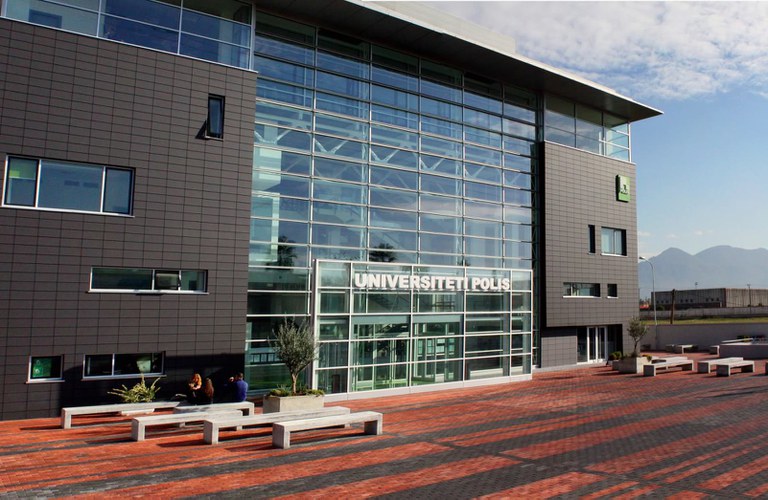 Polis University
Polis University
Tirana, Albania
Web Site
Image source/credits: internet
Associate Members
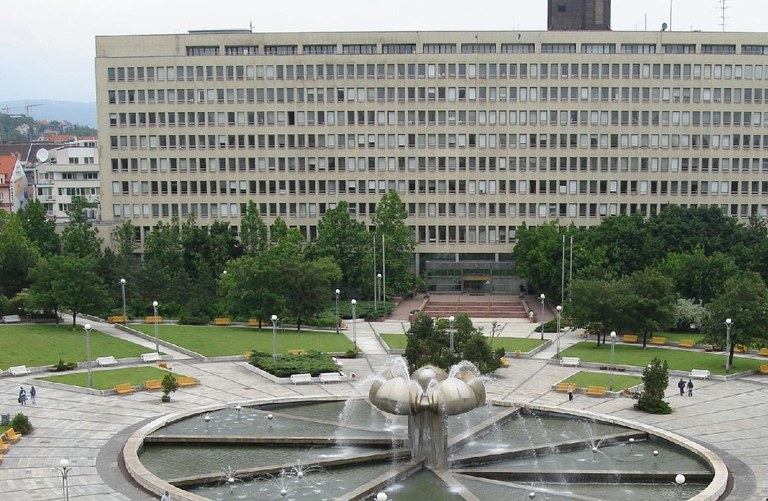 STU - Slovak University of Technology
STU - Slovak University of Technology
Bratislava, Slovacchia
Web Site
Image source/credits: internet
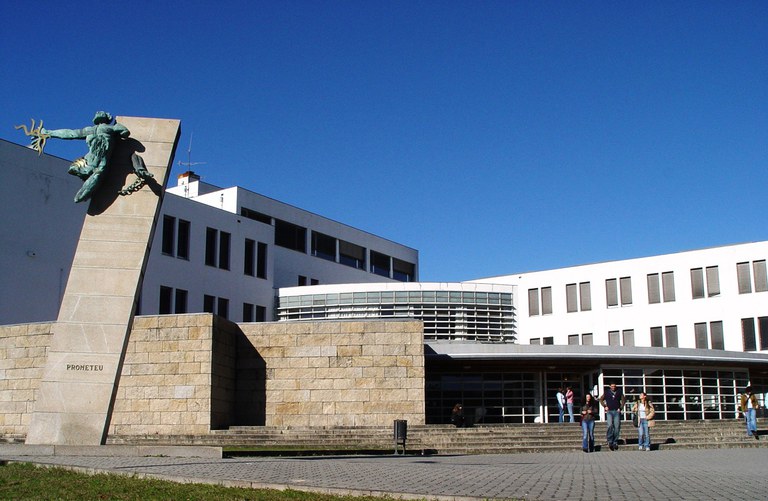 University do Minho
University do Minho
Guimaraes, Portogallo
Web Site
Image source/credits: internet
Industrial Partner
Scientific Collaboration between DA/UniFe IDAUP e Focchi SpA (Focchi Group) 2019
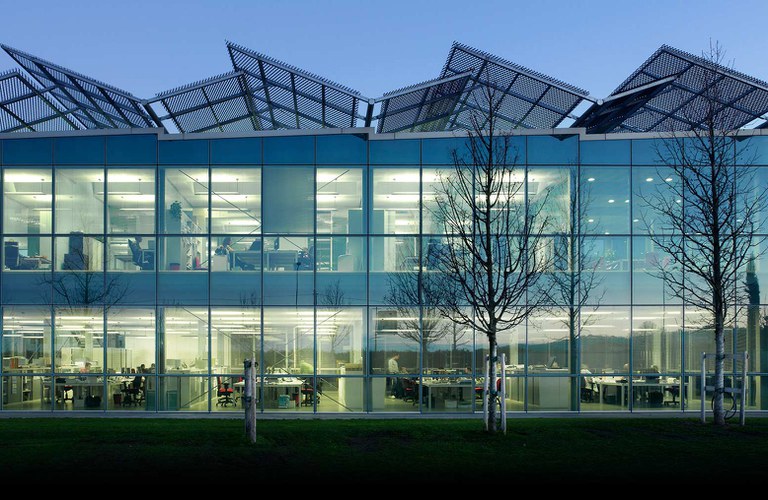 Focchi S.p.A.
Focchi S.p.A.
Poggio Torriana, Rimini, Italy
Web Site
Image source/credits: internet
Awards
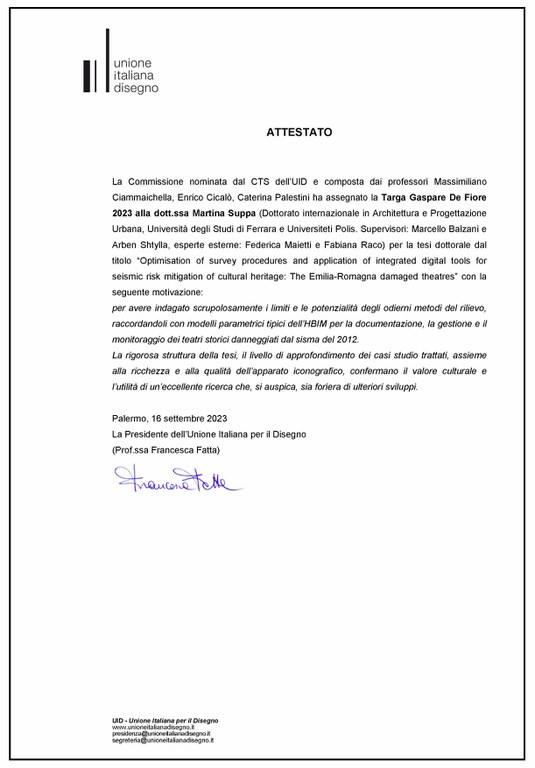
Martina Suppa vince il premio Targa Gaspare De Fiore 2023 dall’Unione Italiana Disegno (UID)
Thesis Supervisor DA-UniFe: Prof. Marcello Balzani
Thesis External Supervisor POLIS University: Prof. Arben Shtylla
External Experts : Prof. Federica Maietti e Dr. Fabiana Raco.
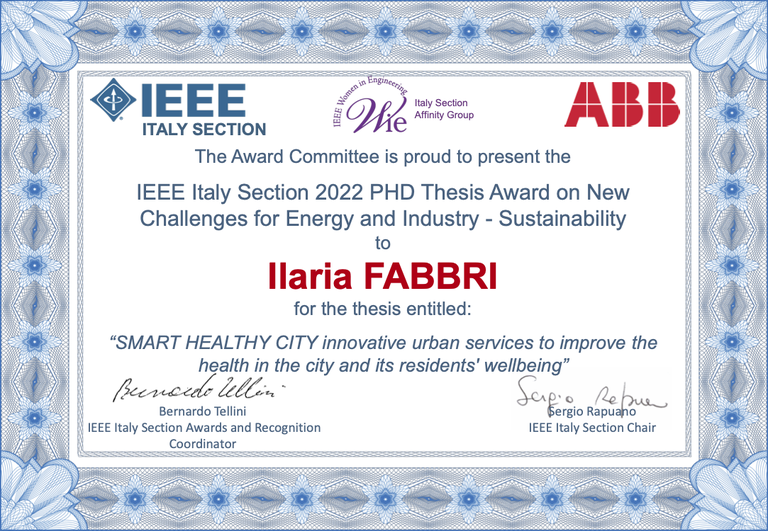 Ilaria Fabbri wins the ABB-IEEE Award 2022 for best Master and PhD theses - Sustainability Category
Ilaria Fabbri wins the ABB-IEEE Award 2022 for best Master and PhD theses - Sustainability Category
Thesis Supervisor DA_UniFe: Prof. Gabriele Lelli
Thesis External Supervisor POLIS University: Dr. Llazar Kumaraku
External Expert : Prof. Stefano Capolongo (PoliMi)
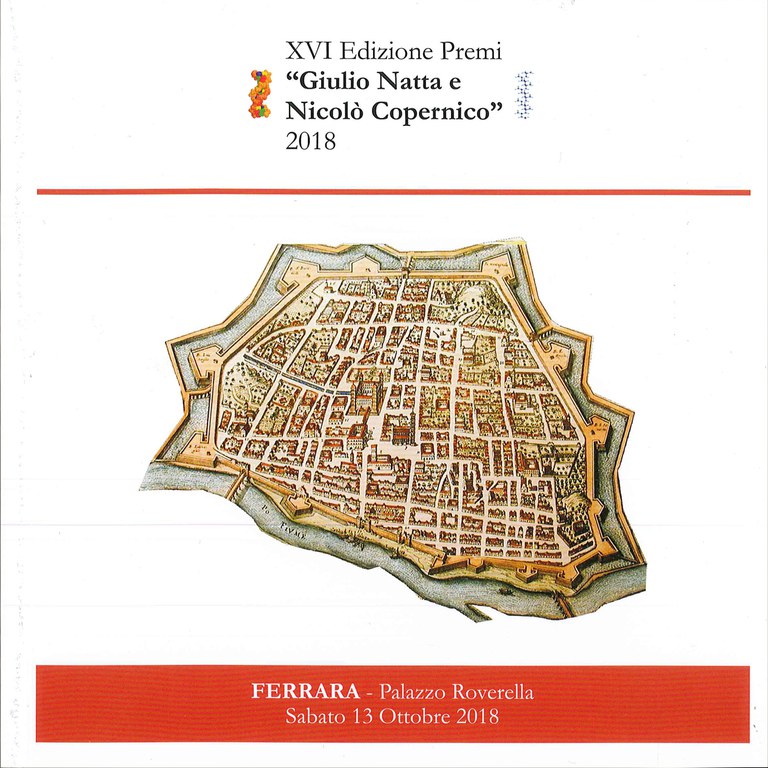 Alessandro Pracucci among the winners of “Giulio Natta e Nicolò Copernico” Awards 2018
Alessandro Pracucci among the winners of “Giulio Natta e Nicolò Copernico” Awards 2018
Thesis Supervisor DA_UniFe: Prof. Theo Zaffagnini
Thesis External Supervisor POLIS University: Prof. Emeritus Luljeta Bozo
Expert DA: Dr. Giacomo Bizzarri
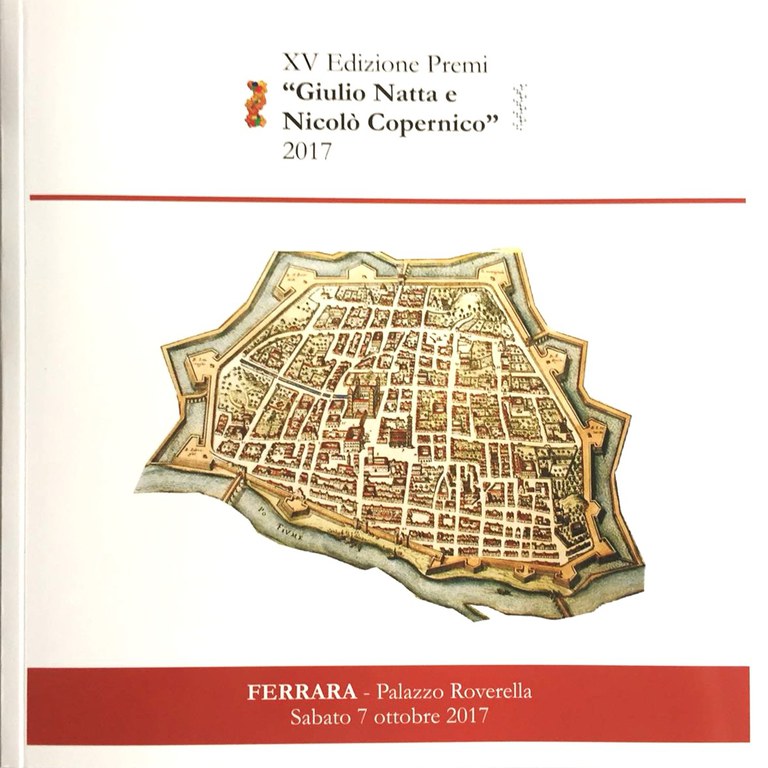
Elena Dorato among the winners of “Giulio Natta e Nicolò Copernico” Awards 2017
Thesis Supervisor DA_UniFe: Prof. Romeo FARINELLA
Thesis External Supervisor POLIS University: Prof. Artan FUGA
External Expert: Prof. Antonio BORGOGNI
Scientific Publications
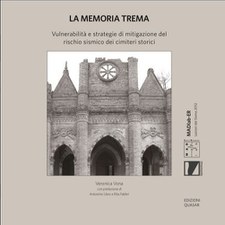 2024
2024
La memoria trema. Vulnerabilità e strategie di mitigazione del rischio sismico dei cimiteri storici
Quasar, Collana MadLab ER. Lezioni dal Sisma del 2012, Italy
Veronica Vona
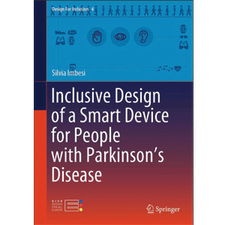 2024
2024
Inclusive Design of a Smart Device for People with Parkinson’s Disease
Springer, Switzerland
Silvia Imbesi
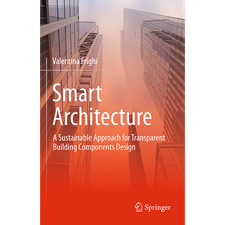 2022
2022
Smart Architecture. A Sustainable Approach for Transparent Building Components Design
Springer, Switzerland
Valentina Frighi
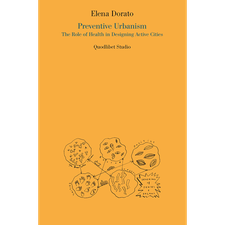
2020
Preventive Urbanism. The Role of Health in Designing Active Cities
Quodlibet Studio, Collana Città e Paesaggio, Italy
Elena Dorato
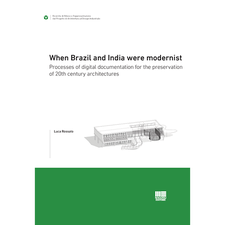
2020
When Brazil and India were modernist. Processes of digital documentation for the preservation of 20th century architectures
Maggioli Editore, Italy
Luca Rossato
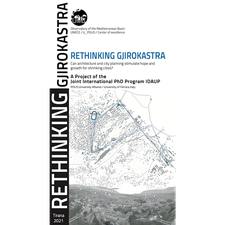
2021
OMB No.7 Gjirokastra
Polis University
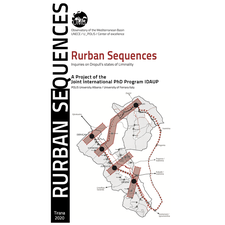
2020
OMB No.6 Rurban Sequences
Polis University
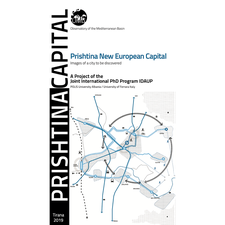
2019
OMB No.5 Prishtina New European Capital
Polis University

2018
OMB No.4 Projecting Shkodra
Polis University
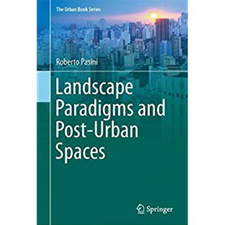
2019
Landscape Paradigms and Post-urban Spaces: A Journey Through the Regions of Landscape
Springer, Switzerland
Roberto Pasini
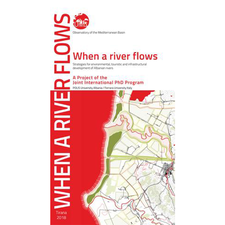
2018
OMB No.3 When a River Flows
Polis University
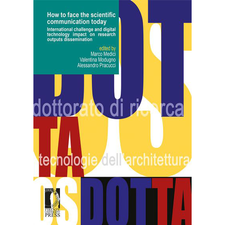
2017
How to face the scientific communication today. International challenge and digital technology impact on research outputs dissemination
Medici, Marco; Modugno, Valentina; Pracucci, Alessandro
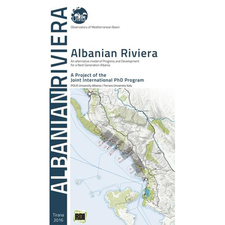
2016
OMB No.2 Albanian Riviera
Polis University
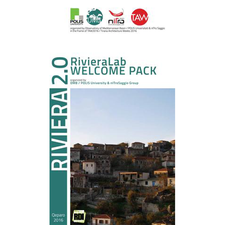
2016
OMB No.1 Rivieralab Welcome Pack
Polis University
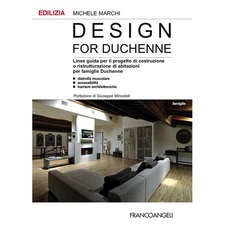
2016
Design for Duchenne. Linee guida per il progetto di costruzione o ristrutturazione di abitazioni per famiglie Duchenne
Michele Marchi
PhD Archive
Discover our PhD Archive, which collects the activities and achievements of the International PhD in Architecture and Urban Planning (IDAUP).
What you will find:
- Academic Boards by Cycle: An archive organized by academic boards for each cycle.
- PhD Candidates & Alumni: Profiles and information on all active and graduated PhD students.
- PhD Theses: Access to dissertations from previous cycles.
- Educational Activities: A record of activities conducted within the program.
- Awards & Recognitions: A list of awards received by our PhD students over the years.
- Publications: A catalog of scientific publications produced as part of IDAUP.
- IDAUP Statistics: Data and insights about the program.
Contacts
Info IDAUP
idaup@unife.it
Coordinator IDAUP
Prof. Theo Zaffagnini
Vice-Coordinator IDAUP
Prof. Besnik Aliaj
besnik_aliaj@universitetipolis.edu.al
Vice-coordinator DA IDAUP
Prof.ssa Veronica Balboni
DA PhD Programme Supervisor
Dr. Elena Dorato
POLIS PhD Programme Supervisor
Dr. Malvina Istrefaj
Credits
Contents edited by Prof. Theo Zaffagnini
Events and News IDAUP
-
Presentazione del corso dottorale IDAUP del Dipartimento di Architettura (DA) dell’Università degli Studi di Ferrara consorziato con POLIS University (Tirana, Albania) - Introduction to the IDAUP doctoral course of the Department of Architecture (DA) of the University of Ferrara in a consortium with POLIS University (Tirana, Albania)


